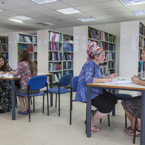This website uses cookies to ensure you get the best experience on our website. privacy policy and terms of use.
September 2023

The Jerusalem College of Technology announced it has opened access for native English speakers to its illustrious engineering degrees. This new model will enroll English speakers in a new track of the JCT International Program. That track will start with a year of Ulpan (Hebrew language courses) and computer science and math courses taught in English. Following that year, students will have the option to continue studying Computer Science fully in English or to transition to other engineering majors, taught in Hebrew.
JCT offers engineering degrees in software, industrial, electrical, and electro-optical engineering. In addition, the one-year track in JCT’s International Program will qualify students to enter JCT’s highly regarded Bioinformatics program.
This new option will be introduced in the fall of 2024 and will enable students to obtain a wide range of engineering degrees at JCT (the only religious engineering college in Israel).
The first year of the program will include those courses most often taken by new engineering or computer science students including calculus, linear algebra, and others. They will be coupled with a rigorous Ulpan that will teach Hebrew language, including the professional vocabulary that is essential to studying engineering in Hebrew.
Prof. Abba Engelberg, the academic dean of the International Program, stressed that the Hebrew language training is a unique aspect of the program and it can open doors to the full gamut of engineering courses offered at the school.
“We want to prepare our students for life in Israel and that includes having a strong knowledge of the language” he said. “The program’s built-in ulpan, gives students the option to choose from a plethora of engineering classes offered on campus after they have a good grasp of Hebrew. Potentially, after their first year, they can integrate into degree tracks like electro-optical engineering, electrical engineering, software engineering and many more, alongside native-born Israelis.”
The new track is a direct response to the popular demand for engineering studies in Jewish communities around the world as the next generation of students are increasingly interested in obtaining degrees in practical areas of study that will yield high-level income upon graduation.
More than 90% of JCT’s alumni are employed in their field within a year of graduation. JCT graduates enter the workforce in leading firms such as Intel, Google, Microsoft, Amdocs, Rafael, Elbit, Check Point, Texas Instruments, and IBM.
“Students from across the globe want to study engineering and computer science because those are considered prestigious areas of study. Our International Program has grown by over 25 percent this past year and the more disciplines that we offer, the more students can realize their dream of earning their degrees in Israel,” explained Rabbi Shlomo Anapolle, Director of JCT’s International Program.
Rabbi Anapolle added, “Prof. Zev Lev’s founding vision for JCT was that it would educate students to synthesize their profession with Torah learning, while also developing Israel's hi-tech industry and producing Jewish leaders who are dedicated to the country. This program does just that."
He continued, “The vision of JCT is to drive change throughout the country and across the globe. This launch furthers JCT’s reach and expands our ability to have our students realize their academic and professional goals.”
JCT’s students hail from 38 countries around the world. Approximately 70% of the international students come from North America. The College’s student body has the highest percentage of new immigrants (6%) of any higher education institution in the country.

This year marked the 30th annual Torah and Science Conference hosted at JCT

Professor Netanel Foxbrumer's Outstanding Contributions during the Swords of...

JCT Teams Up with MMY to offer academic programming to women studying in the...